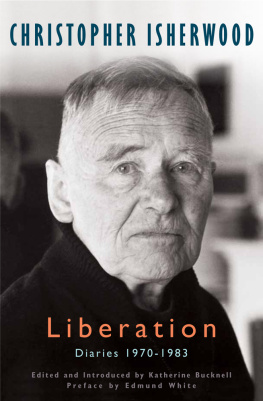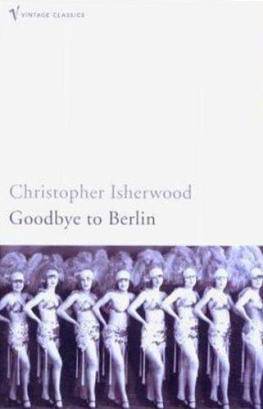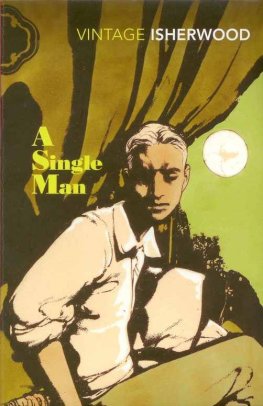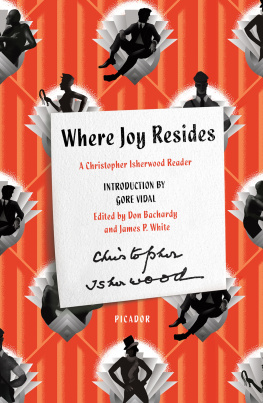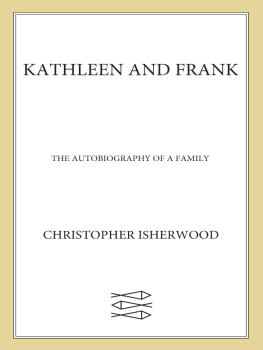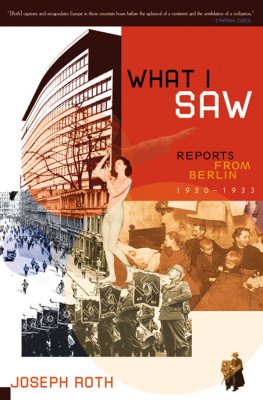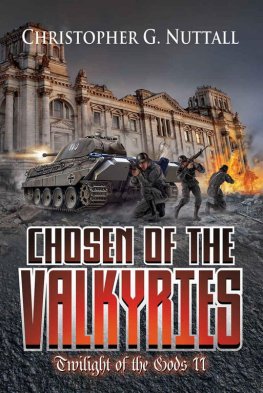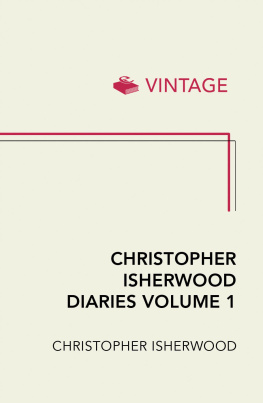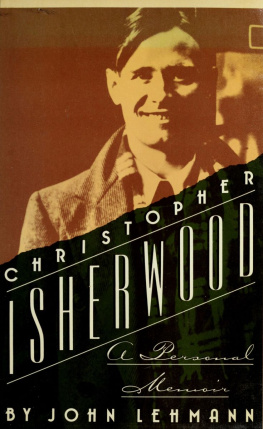
The author and publisher have provided this e-book to you for your personal use only. You may not make this e-book publicly available in any way. Copyright infringement is against the law. If you believe the copy of this e-book you are reading infringes on the authors copyright, please notify the publisher at: us.macmillanusa.com/piracy.
Contents
TO DON BACHARDY
MY THANKS
to my brother Richard and to Don Bachardy, for the help they gave me while I was writing this book;
to John Lehmann, Stephen Spender, and Edward Upward, for letting me quote from their letters to me;
to Professor Edward Mendelson, literary executor of the estate of W. H. Auden, for letting me quote from Audens unpublished writings;
to the Provost and Scholars of Kings College, Cambridge, for letting me quote from E. M. Forsters letters to me;
to P. N. Furbank, Forsters biographer, for answering my questions about him;
to Rudolph Amendt, for answering my questions about pre-Hitler Berlin;
to Werner and Susanne Rosenstock, for giving me information about the life of Wilfrid Israel;
to Babette Deutsch, for permission to quote from her translation of Ilya Ehrenburgs poem The Sons of Our Sons, included in A Treasury of Russian Verse,
edited by Avrahm Yarmolinsky
C.I. July 1976
ONE
There is a book called Lions and Shadows, published in 1938, which describes Christopher Isherwoods life between the ages of seventeen and twenty-four. It is not truly autobiographical, however. The author conceals important facts about himself. He overdramatizes many episodes and gives his characters fictitious names. In a foreword, he suggests that Lions and Shadows should be read as if it were a novel.
The book I am now going to write will be as frank and factual as I can make it, especially as far as I myself am concerned. It will therefore be a different kind of book from Lions and Shadows and not, strictly speaking, a sequel to it. However, I shall begin at the point where the earlier book ends: twenty-four-year-old Christophers departure from England on March 14, 1929, to visit Berlin for the first time in his life.
Christopher had been urged to come to Berlin by his friend and former schoolmate Wystan Hugh Audenwho is called Hugh Weston in Lions and Shadows. Wystan, then aged twenty-two, had been on a study holiday in Germany since taking his degree at Oxford.
While in Berlin, Wystan had met the anthropologist John LayardBarnard in Lions and Shadows. Layard had once been a patient and pupil of Homer Lane, the American psychologist. He had introduced Wystan to Lanes revolutionary teachings, thus inspiring him to use them as a frame of reference for his poems. Wystan had now begun to write lines which are like the slogans of a psychiatric dictator about to seize control of the human race: Publish each healer It is time for the destruction of error Prohibit sharply the rehearsed response Harrow the house of the dead The game is up for you and for the others Love needs death death of the old gang New styles of architecture, a change of heart.
According to Lane-Layard:
There is only one sin: disobedience to the inner law of our own nature. This disobedience is the fault of those who teach us, as children, to control God (our desires) instead of giving Him room to grow. The whole problem is to find out which is God and which is the Devil. And the one sure guide is that God appears always unreasonable, while the Devil appears always to be noble and right. God appears unreasonable because He has been put in prison and driven wild. The Devil is conscious control, and is, therefore, reasonable and sane.
Life-shaking words! When Christopher heard them, he was even more excited than Wystan had been, for they justified a change in his own life which he had been longing but not quite daring to make. Now he burned to put them into practice, to unchain his desires and hurl reason and sanity into prison.
However, when Lions and Shadows suggests that Christophers chief motive for going to Berlin was that he wanted to meet Layard, it is avoiding the truth. He did look forward to meeting Layard, but that wasnt why he was in such a hurry to make this journey. It was Berlin itself he was hungry to meet; the Berlin Wystan had promised him. To Christopher, Berlin meant Boys.
At school, Christopher had fallen in love with many boys and been yearningly romantic about them. At college he had at last managed to get into bed with one. This was due entirely to the initiative of his partner, who, when Christopher became scared and started to raise objections, locked the door, and sat down firmly on Christophers lap. I am still grateful to him. I hope he is alive and may happen to read these lines.
Other experiences followed, all of them enjoyable but none entirely satisfying. This was because Christopher was suffering from an inhibition, then not unusual among upper-class homosexuals; he couldnt relax sexually with a member of his own class or nation. He needed a working-class foreigner. He had become clearly aware of this when he went to Germany in May 1928, to stay with an elderly cousin who was the British consul at Bremen. He had no love adventures while there, but he looked around him and saw what he was missing. The Bremen trip isnt even mentioned in Lions and Shadows because Christopher was then unwilling to discuss its sexual significance. It is described in a novel written many years later, Down There on a Visit, but with too much fiction and too little frankness.
* * *
Christophers first visit to Berlin was shorta week or ten daysbut that was sufficient; I now recognize it as one of the decisive events of my life. I can still make myself faintly feel the delicious nausea of initiation terror which Christopher felt as Wystan pushed back the heavy leather door curtain of a boy bar called the Cosy Corner and led the way inside. In the autumn of 1928, Christopher had felt a different kind of nauseated excitement, equally strong and memorable, when, as a medical student, he had entered an operating theater in St. Thomass Hospital to watch his first surgical operation. But the door of the operating theater, unlike that of the Cosy Corner, led him nowhere. Within six months, he had given up medicine altogether.
At the Cosy Corner, Christopher met a youth whom I shall call Bubi (Baby). That was his nickname among his friends, because he had a pretty face, appealing blue eyes, golden blond hair, and a body which was smooth-skinned and almost hairless, although hard and muscular. On seeing Bubi, Christopher experienced instant infatuation. This wasnt surprising; to be infatuated was what he had come to Berlin for. Bubi was the first presentable candidate who appeared to claim the leading role in Christophers love myth.
What was this role? Most importantly, Bubi had to be the German Boy, the representative of his race. (Bubi was actually Czech, but that could be overlooked since German was the only language he spoke.) By embracing Bubi, Christopher could hold in his arms the whole mystery-magic of foreignness, Germanness. By means of Bubi, he could fall in love with and possess the entire nation.
That Bubi was a blond was also very importantand not merely because blondness is a characteristic feature of the German Boy. The Blondno matter of what nationalityhad been a magical figure for Christopher from his childhood and would continue to be so for many years. And yet I find it hard to say why John Layard would have encouraged me to invent an explanation, never mind how absurd it sounded. He would have said that anything one invents about oneself is part of ones personal myth and therefore true. So here is the first explanation which occurs to me: Christopher chose to identify himself with a black-haired British ancestor and to see the Blond as the invader who comes from another land to conquer and rape him. Thus the Blond becomes the masculine foreign yang mating with Christophers feminine native yin This makes a kind of Jungian sensebut I cant by any stretch of the imagination apply it to the relations between Bubi and Christopher. Bubi had been, among other things, a boxer, so he must have been capable of aggression. But with Christopher he was gentle, considerate, almost too polite.


